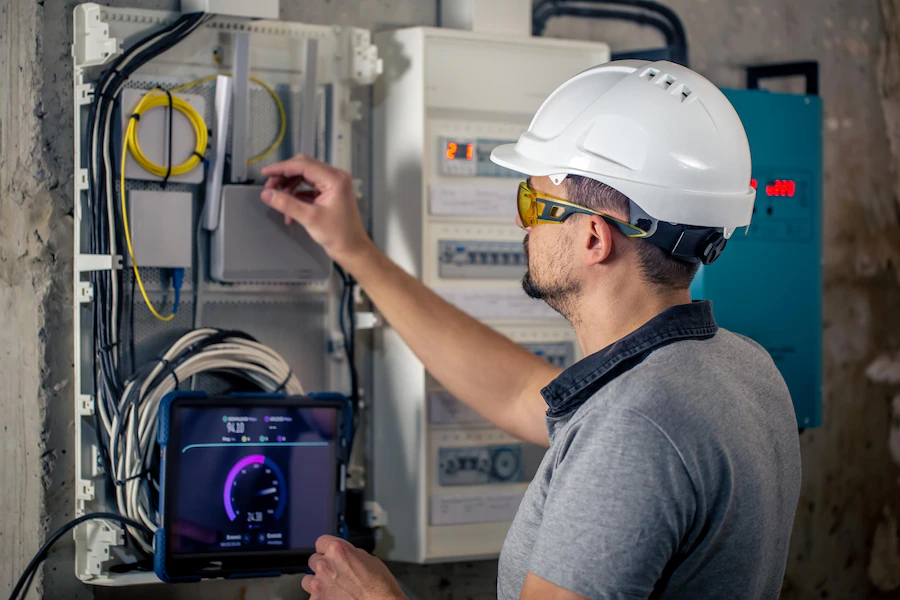
The world of electricity services is ever-evolving, encompassing changes in the distribution and generation of power as well as advances in technological solutions.
The drive to meet the growing demand for reliable, efficient, and sustainable power supply is an engine that pushes advancements in this critical sector.
This write-up guides you through the latest tech trends defining electricity services today.
Smart Grid Technology
Smart grid technology marks a paradigm shift in how you understand and manage your electricity needs.
The integration of information technology into power delivery systems allows for real-time monitoring and control of electricity flow, reducing voltage fluctuations and outages.
To thoroughly comprehend this complex process, it is important to familiarize oneself with the electrical work details involved.
These details shed light on the intricacies of how energy management functions. The technology also facilitates the seamless integration of renewable energy sources into the grid, promoting sustainability.
Digital Twin Technology
Incorporating digital twin technology in electricity services is gearing up to change the face of asset management.
This technology creates virtual replicas of physical assets or systems, enabling predictive maintenance by providing insights into potential equipment failures before they occur.
Digital twins are also instrumental in planning system upgrades with minimum disruption to the electricity supply.
Battery Storage Solutions
Battery storage solutions have seen a drastic tech transformation resulting in improved capacity and longer life cycles.
These solutions are particularly beneficial for integrating solar energy into the grid due to their intermittent nature.
Advanced batteries also facilitate peak shaving strategies and ease grid management during periods of high power demand.
Solar Photovoltaic Technology
Solar photovoltaic (PV) technology is rapidly gaining prominence owing to its cost-effectiveness and green energy credentials.
Technological advancements have resulted in improved efficiency of solar panels, making them a more viable and efficient source of energy in several regions.
Furthermore, the development of “building-integrated photovoltaics” or BIPV is poised to reduce grid dependency and contribute to building efficiency.
Microgrid Systems
Microgrid systems, comprising small-scale power grids with their own generation sources, are emerging as flexible and efficient alternatives to traditional power grids.
They enhance energy resilience by enabling areas to operate independently in case of grid disruptions.
With advancements in control technology, these systems also allow for seamless integration and management of multiple renewable energy resources.
Grid Automation Solutions
Grid automation solutions immersed in electricity services are becoming crucial for efficient operation and control.
Automated substations, distribution management systems, and advanced metering infrastructure are just a few examples. These technologies enhance operational efficiency, reduce power losses, and improve responses to grid disturbances.
Internet Of Things (IoT)
The Internet of Things (IoT) is influencing multiple aspects of electricity services. Remote monitoring and asset management facilitate real-time oversight of system performance.
IoT devices can provide early warnings about potential problems thereby reducing unplanned downtime due to equipment failure.
Demand Response Programs
In the sphere of electricity services, demand response programs have seen technological advancements paving the way for interactive consumer relationships with utility providers.
You can now actively participate in managing your energy usage pattern during peak demand periods aided by smart device technologies.
Such programs promote energy saving and reduce stress on the electrical grid.
Electric Vehicles
Electric vehicle technology has witnessed considerable innovations that are influencing power distribution networks.
Besides reducing carbon footprint, these vehicles when plugged into the grid can help manage demand peaks by allowing the grid to pull stored energy from car batteries during high demand periods.
Machine Learning And AI
Machine learning and AI in electricity services are innovating forecasting, asset management, and outage response.
Algorithms can predict demand trends and potential outages, allowing grid managers to optimize resources and prevent disruptions.
AI-powered bots can track real-time customer queries thereby improving service quality in the electrical sector.
Data Analytics In Power Management
Data analytics is improving operational efficiency in electricity services.
Real-time data together with historical trends on power usage, equipment health, and energy costs are aiding decision-making.
This not only promotes energy efficiency but also assists in predictive maintenance and proactive problem-solving.
Cybersecurity Measures
The digital transformation of electricity services surfaces critical concerns about cybersecurity.
Thus, trends focus on implementing advanced security measures including encryption technologies and intrusion detection systems to protect grid infrastructure from cyber threats.
It is paramount to safeguard sensitive data related to power generation, distribution, and consumption from possible cyber-attacks that could disrupt power supply.
Real-Time Pricing Mechanisms
Real-time pricing mechanisms enabled by advanced metering infrastructure provide transparency in billing based on demand-supply dynamics.
You can better manage your power use, harnessing tariffs when demand is low and thus, contributing to system stability.
In Conclusion
In a rapidly digitizing world, the technological evolution in electricity services is transforming how power is produced, distributed, and consumed.
The trends delineate a future of greener, efficient, reliable, and consumer-centric power systems.
You play a vital role in this progress by embracing tech innovations while also gaining from improved service delivery and energy optimization.
Read Also:






